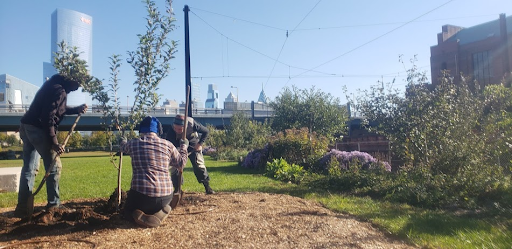Penn’s Secret Garden

At Penn, life is dominantly urban. From dodging cars to eating from halal carts, it sometimes feels like we live in an amalgamation of concrete and grease. On top of this, we’re removed from our food; everything we consume has been processed a million ways before it reaches us. Luckily, though, Penn has ways to help us remember where our meals come from.
The Penn Garden occupies an unassuming space behind Penn’s Harrison College House. Consisting of a half dozen soil beds, the garden serves as a rare place where we can connect to our food. The orchard, located in Penn Park, serves a similar function. Although both are undoubtedly urban (I-76 is visible from the orchard and Spruce Street from the garden), they provide an opportunity to relax and get your hands dirty.
According to Lila Bhide, a Penn staff member who runs the garden, its philosophy is to showcase the diversity of what can be grown in an urban setting. Crops vary between vegetables, herbs, fruits, and nuts from around the world. The goal is that every Penn student, regardless of where they come from, should be able to recognize produce from their background. The garden aims to use local and organic seeds, and the orchard focuses on native plants and pollinators. At the end of the day, produce from the garden goes to low cost food bags in partnership with the Agatston Urban Nutrition Initiative.
The Penn Garden isn’t the only urban garden in Philadelphia. Unassuming farms emerge on vacant lots, but become much more for communities. Bhide credits urban farms with being vibrant community hubs. They provide food to residents but also host events, after school programs, and celebrations. Urban gardens allow people to maintain skills; for instance, African American migrants from the south as well as immigrants from abroad can preserve their cultural heritage. For Philadelphia, a city with high levels of food insecurity and poverty, urban gardens are an essential part of its fabric.
The garden and orchard provide a way for busy students to slow down and connect to the rich tradition of Philadelphia’s urban gardens. Interested students can apply to the Penn Garden Advisory Board, come to garden events, harvest from the orchard, and collaborate to host an event with their student groups. After all, food impacts everybody.
